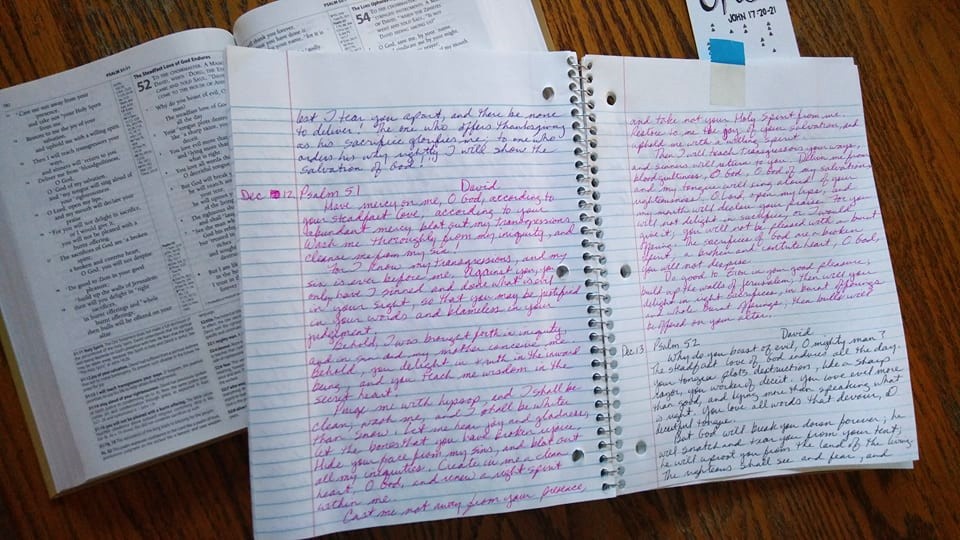
Why and How to Do It • Plain or Fancy Methods
Daily time in the Word is a struggle for many Christians, and for many years, I was no exception. Despite my good intentions, I couldn’t seem to find the time or motivation to read my Bible every day, even though I truly wanted to and knew that I should.
Since 2018, I’ve been reading the Bible daily without fail, and I can give credit to one simple thing that has made this change possible. Scripture writing has utterly transformed my spiritual life (no exaggeration), my mornings, and my Bible time.
Here’s how it happened: I began Scripture writing with very small bits of Scripture, taking baby steps and establishing a pattern of opening my Bible first thing every single morning. After a year or two, I had formed a very strong morning habit and had also added my own evening readings from other parts of the Bible. Which led to where I am now: expanding my daily Scripture writing to much longer passages that I choose myself, while continuing to read the Bible in the evenings (in a translation I haven’t read before). For the first time in my Christian life, I feel I’m soaking in God’s Word every single day.
Because it was life-changing for me, I want to share how to begin a habit of Scripture writing for those who want to give it a try. I’ve asked two friends who practice this discipline, and who do it differently from me, to also share their experiences. So I (Rebekah), along with friends Debbie (who inspired me) and Katie (a young friend whose story is so encouraging), will answer the questions most people want to know when they ask what Scripture writing is all about: Why did you begin Scripture writing? How did you begin and how do you do it now? And what method do you use?
Why did you begin Scripture writing?
Rebekah: I’d been a Christian for more than 20 years and had never developed a foolproof plan for daily time in the Word. I was looking for a way to read my Bible every single day that was doable and would fit in with my busy life. It appealed to me because I enjoy writing and I thought that the physical act of writing might help me focus and remember what I was reading.
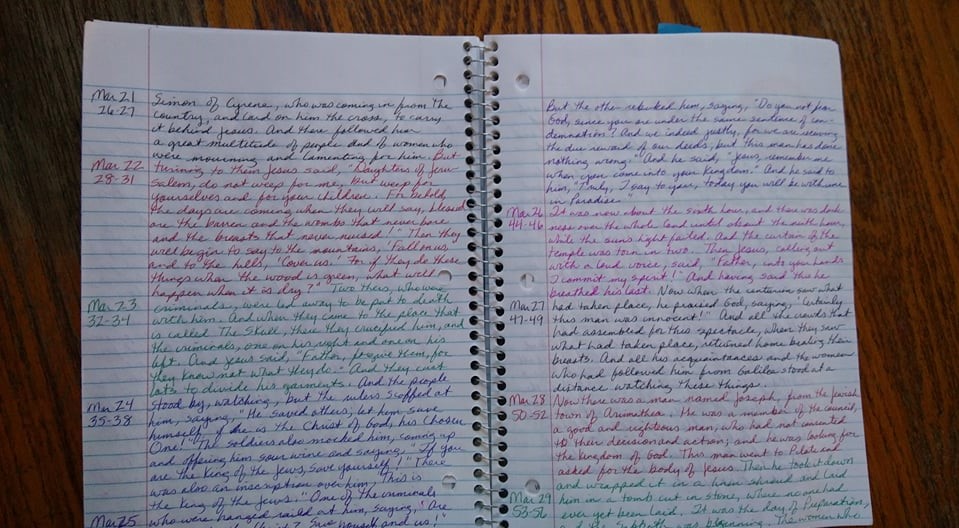
Debbie: In 2013, I found myself devastated by church trauma. I was trying to hang onto my faith and survive the rupture of multiple relationships. It was during that time when I had very little resiliency that I started just reading and meditating on only one verse a day. In those days, one verse seemed like a HUGE undertaking as I tried to navigate depression and anxiety. Eventually, it turned into writing out one verse a day.
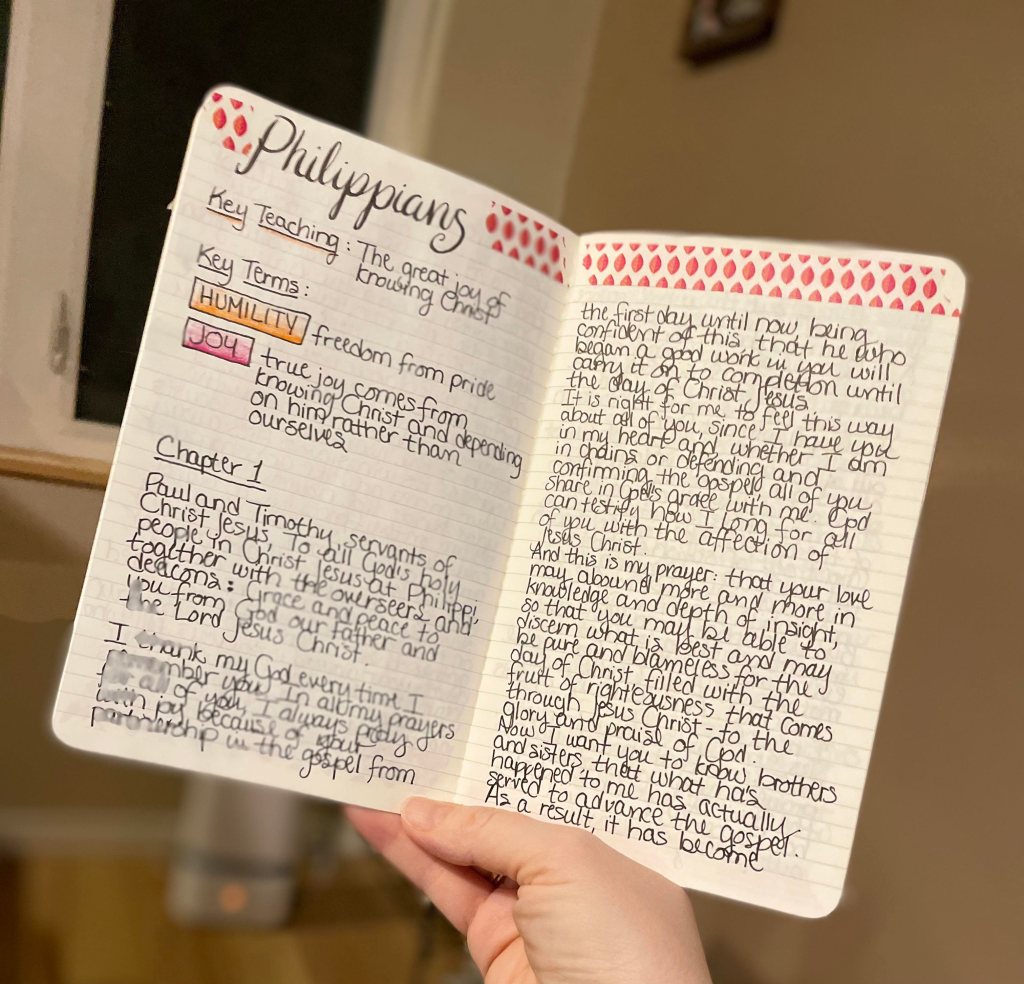
Katie: Over my life and especially in the past couple of years, I’ve struggled SO much with how to connect with God’s word. I’ve always wanted to have a deeper relationship with Him, and know more about who He is, but it wasn’t until I went through some things that really shook my faith that I got serious about it.
At one point God gave me a desire to pick up the Bible and start digging into it for myself. And I couldn’t focus on a single word. I have complex PTSD and with that comes brain fog that kinda sucks the life out of me. I was reading the words but I couldn’t even string them together to form a sentence or a phrase. I got frustrated and I remember asking God, “What’s the point if I don’t even understand what it is that I’m reading?”
I asked a dear friend that question and she said, “But that’s not the point. You aren’t reading to be smarter and know more things, you’re reading to know Jesus. And He can still speak even if you only read one verse and you feel like you don’t understand it. You don’t have to bring understanding to the table, you just need to show up. God is the one who will speak and teach you what you need to know. And maybe right now you are learning to simply be obedient. Even when you don’t see the point, even when it seems to go in one ear and out the other, even still, do it because He’s telling you to. Let that be reason enough. Maybe write out a verse every day, or …” I said, “But I mean, it’s not like I can just write out entire books of Scripture.” This woman, who I love dearly and admire greatly, looked me dead in the eye and said, and I quote, “Why not?”
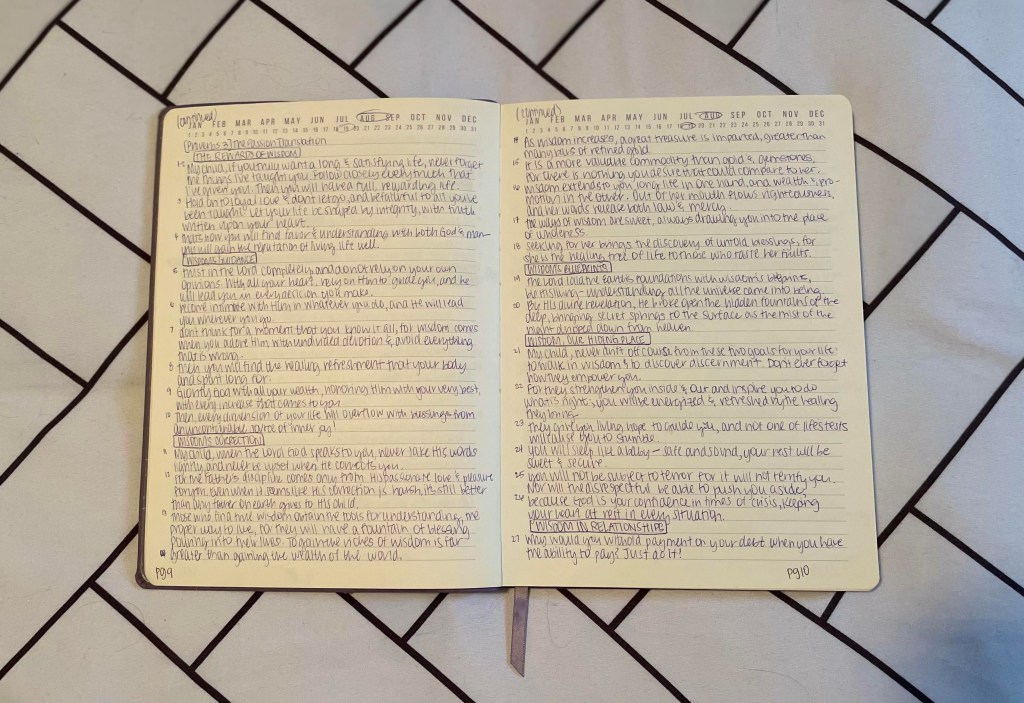
How did you begin and how do you do it now?
Rebekah: I began by using my friend Debbie’s 3-year Scripture writing plans (the same Debbie who is in this article; link to her plans in the next paragraph). I loved that they were super easy to follow, very short, and visually appealing. They were topical, so one month I’d be writing on the theme of “He Loves You” and another month it might be “Prayer” or “Identity in Christ” or “Jealousy.” Every month was a fresh new topic. I did this for the full three years, and then felt that I was ready to move on to longer passages of my own choosing. Now I’m writing out whole books of the Bible in manageable chunks. It’s very flexible because I can write as much or as little as I have time for each day.
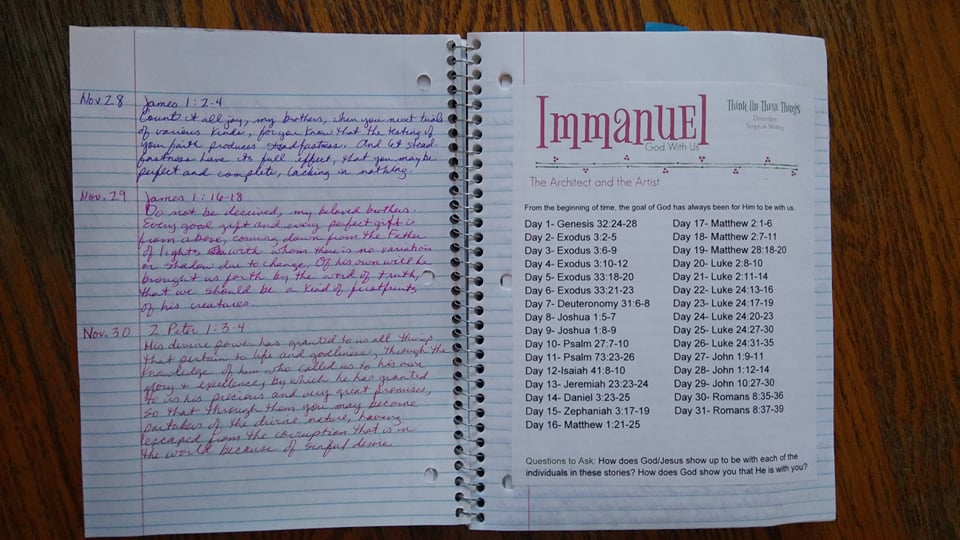
Debbie: As time went on (while I was reading one verse a day), I learned about Scripture writing plans, where all you do is simply write out verses related to a topic. I would go on to create my own Scripture writing plans for a few years that I shared online. Typically, I would pick seasonal themes or topics that I personally was struggling with.
These days I am still doing the simple practice of writing out Scriptures. I can’t seem to give it up as it was instrumental in my healing. I am constantly changing it up to keep things interesting. For example, I am currently using Praying the Scriptures for your Adult Children by Jodie Berndt, writing out the ones that I pray over my grown sons and my daughter-in-law. During Advent, I take whatever devotional I am reading and write out some of the Scriptures mentioned. The practice of writing out God’s Word can change with you as you grow and go through different seasons of life.
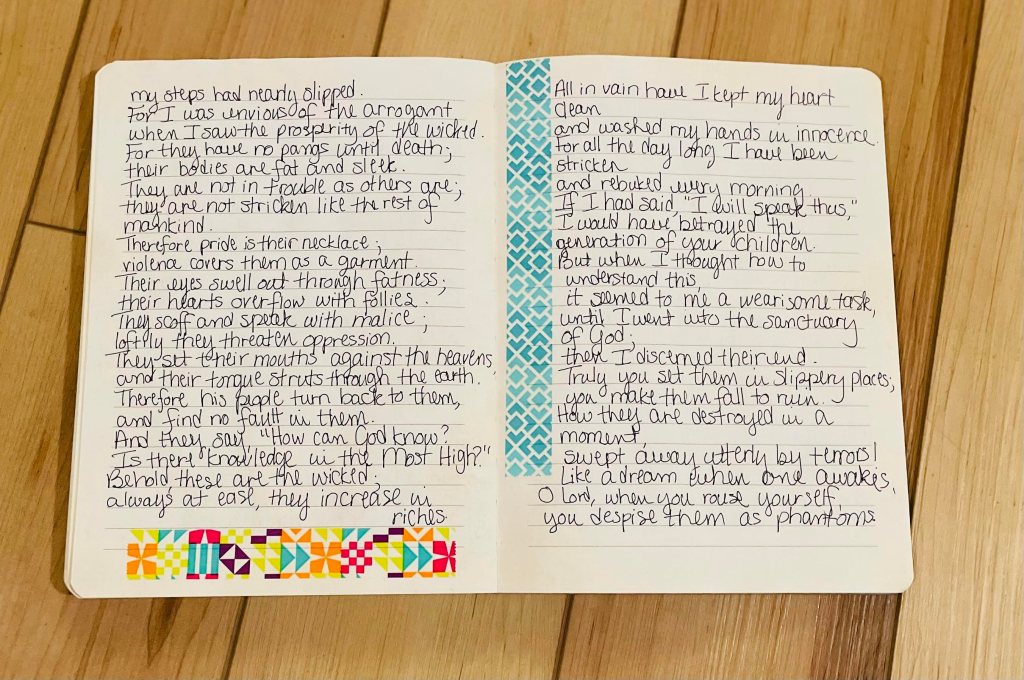
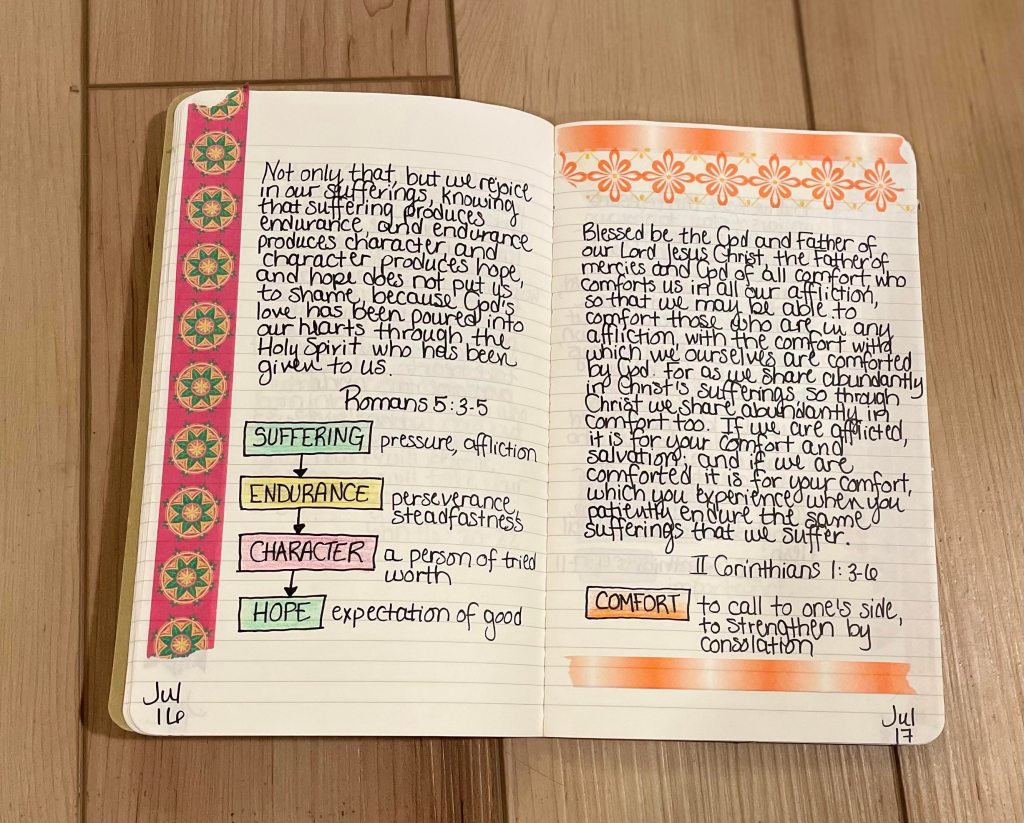
Katie: So the next day [after I talked with my friend], I started writing out some Scripture. I started in Proverbs because someone told me once that it’s a book of wisdom and the good Lord knew I needed that in my life. All of a sudden, I started to realize that Jesus is not who I thought He was at all. He was so much greater, so much kinder, and so much more gracious than I ever thought possible. He is so gentle and sweet and holy and powerful— and most of all He was good. I wanted more and more. I couldn’t get enough.
I started off with Proverbs, and then went to Romans and just finished going through three of the Gospels. I am now going all the way back to Genesis and I’m going to start working through the Old Testament.
Last night I finished my second notebook full of Scripture. I’ve copied five books so far and plan to make my way through all 66. I promise you I am not any more holy or spiritual than you are. I just discovered a new way to connect with Jesus and want to share it because maybe you find yourself in the same predicament of wanting to study the Bible but not knowing how or where to start.
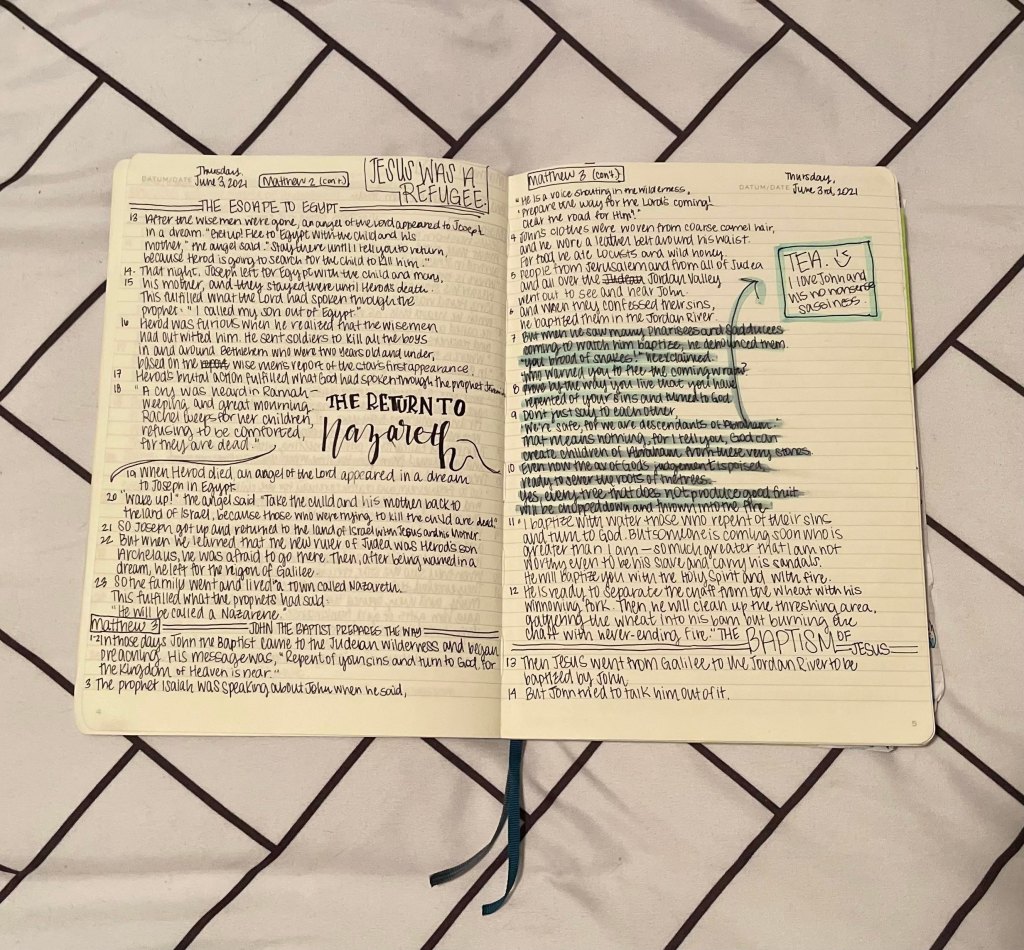
What method do you use?
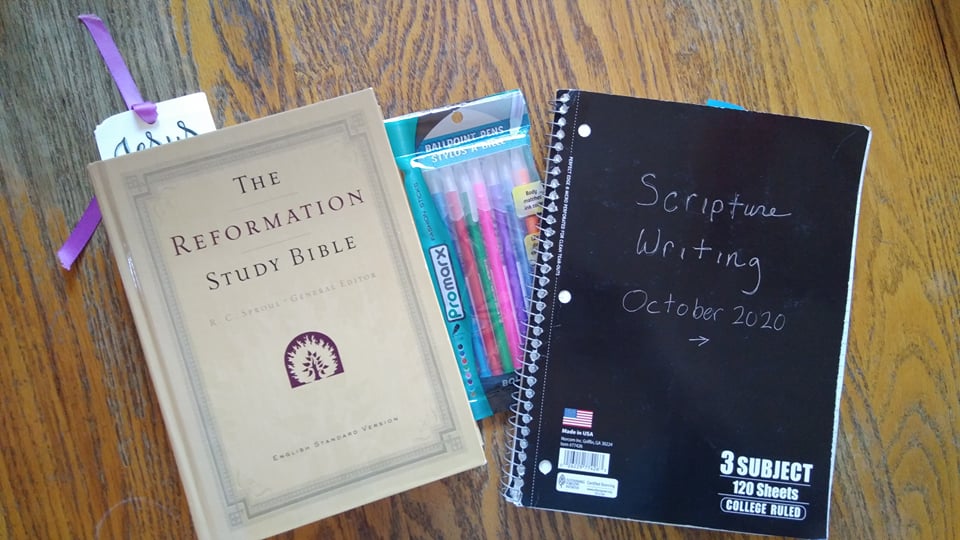
Rebekah: The way I do Scripture writing couldn’t be easier, cheaper, or simpler. I buy 120-page spiral-bound notebooks in August when they’re on sale for 25 or 50 cents each. Then at Dollar Tree, I buy my favorite pens (eight for a dollar) in lovely bright colors. [2024 update: sadly, these pens are no longer available at the dollar store, but I’ve found new favorites in the Pilot Precise brand, which has different colors and line thicknesses, depending on your preferences; Paper Mate InkJoy is another good alternative, available in ballpoint and gel.] Besides my study Bible (or this one) and a bookmark, that’s the extent of my supplies for Scripture writing.
When I used the topical Scripture writing plans, I taped each month’s plan into the notebook and then just started writing. At first I gave myself a very wide margin so I could make notes or journal alongside the Scripture. I soon found that I had set my sights too high or that this just wasn’t “me”—I abandoned that idea and just wrote out the verses margin-to-margin with no commentary of my own.

Now I’ve moved on to writing out whole books of the Bible. My first book, Philippians, was one that I knew I’d be covering in an upcoming Bible study at church (it was also very short—bonus!). My next choice was simply a book that I wanted to spend time in and really let sink into my heart: Psalms. It’s ambitious, for sure, but I’m loving it. After I finish Psalms, I’ll probably do a few short books (maybe 1, 2, 3 John?). You could also write out particular sections of the Bible such as the Sermon on the Mount, the Lord’s Prayer, the story of Jesus’ birth or crucifixion and resurrection, the last two chapters of Revelation, or other passages that are well-known or meaningful to you.
Now that I don’t have a specific schedule to follow, I just write as long as I want, or as I have time for, averaging about a page a day. I stick a huge, can’t-lose-it bookmark in my study Bible and just keep on going the next day. I also have time to read most of the study notes, something I don’t do when reading my one-year Bible in the evening.
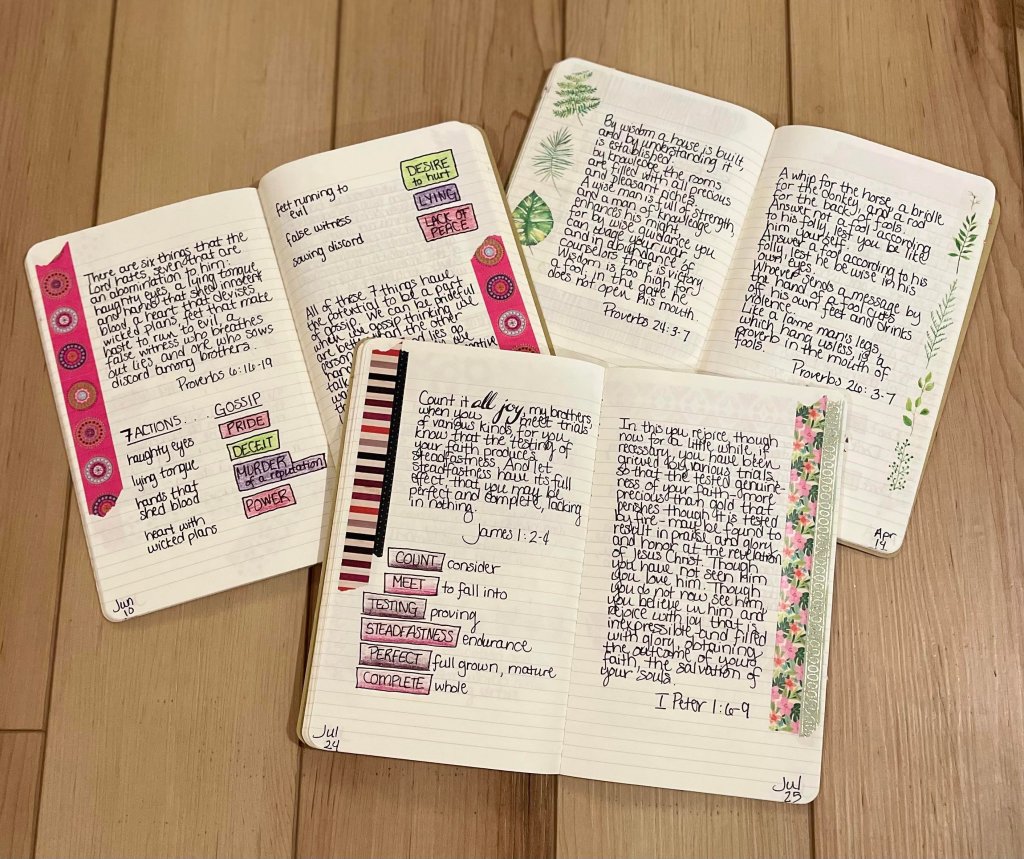
Debbie: Scripture writing can take many forms … you can approach it topically or you can decide to write out whole passages or even books! You can simply write out the verses or do a word study using a concordance (I use the Blue Letter Bible app). Writing out your thoughts about the verses or reading a commentary and taking notes are other options. No matter how you approach it there are benefits. Writing out Scripture slows you down so that you can really think about what is being said. You get to see details you would have otherwise missed in just reading. And because you are focusing on smaller sections of verses, concepts tend to sink deeper.
Your set-up for Scripture writing can take any form … you just need to choose what works well for you. I used Moleskine Cahier journals when I would do topical writing plans, but when I wrote out larger books like the Psalms I used these journals (another lay-flat option is here). Spiral notebooks would also work! There were times that I would decorate my pages with washi tape and there were times when all that was on the page was Scripture. You really can tailor it to your needs and wants.
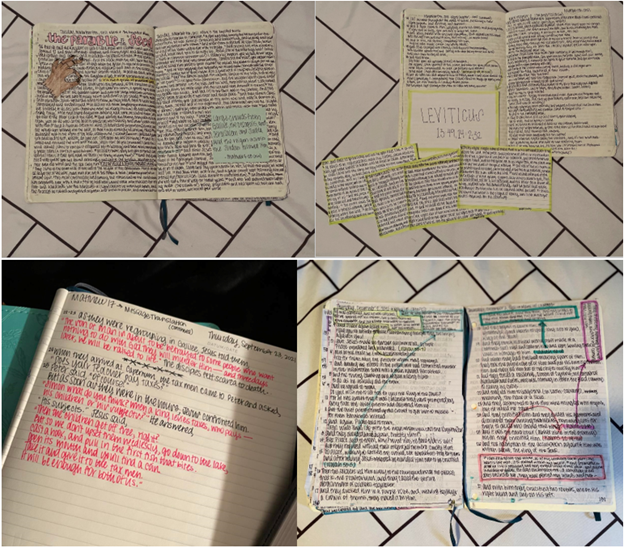
Katie: I started this project with one rule: Write the Scripture. Aim for every day, but don’t feel guilty if you miss a day or two. On the days I felt fancy I might incorporate some cool lettering or doodles. Most days, it was just my regular handwriting, nothing fancy or special. Once I got into a groove I started using post-it notes and flash cards to contain my notes and/or cross references to other Scriptures. I started highlighting because color makes me smile.
I went through a phase of writing the words of Jesus in red, sometimes writing something out in The Message paraphrase to bring a new perspective. I have also used the Amplified Bible, which is a great resource for contextual verses and cross-referencing to kind of bring it all together. This is helpful because up until this point in my life I have felt like I only got bits and pieces, and never connected everything.
I know a lot of young mommas who struggle with guilt because their time with Jesus looks different after kids. And of course it does! You are doing important kingdom work by raising those littles and Jesus will honor you for the effort you are putting in to build your relationship with Him. It’s not about how many verses you write a day or how artsy your pages look. Because Jesus welcomes children too, and He gets the crazy. He’s not being legalistic and harsh, especially when you have littles (or in my case, if you’re a nanny).
It’s okay if you have sloppy handwriting, it’s okay if it looks messy, and it’s also okay if it looks super pretty. This should be your own personal thing with Jesus. So you do you.
But at its core, there is one rule: Write. The. Scripture. I set myself free from my own expectations to figure it out and study it and understand every word. Some days I wrote one verse, some days I wrote five chapters. I don’t set a daily limit or goal because I know that I tend to make things legalistic and for that reason, wanted to keep it simple. Some days I felt like I had learned a ton, and other days I felt like I had no clue what I just read, but every day (with the exception of off days because it happens), I wrote the Scripture. And God showed up in such an awesome way that I’m convinced I’m never going to stop writing Scripture.
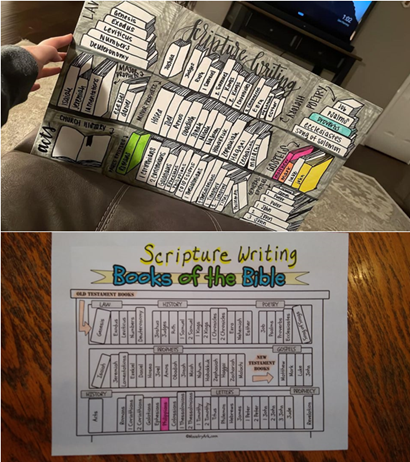
I hope our stories and experiences have inspired you to give Scripture writing a try! (I know it’s not for everyone—maybe give it a month and see if it’s enjoyable and helpful to you?) I’ll leave you with a passage that Debbie shared when she responded to my questions for this article:
“And when he sits on the throne of his kingdom, he shall write for himself in a book a copy of this law, approved by the Levitical priests. And it shall be with him, and he shall read in it all the days of his life, that he may learn to fear the Lord his God by keeping all the words of this law and these statutes, and doing them, that his heart may not be lifted up above his brothers, and that he may not turn aside from the commandment, either to the right hand or to the left…” (Deut. 17:18-20)
Related:
A Gift for Your Scripture Writing (I love using this printable, chapter-by-chapter Scripture writing tracker – you can download it free in this post)
Getting the Most Out of Scripture Writing (a 2024 update of this post, with more tips and info). You can listen to a podcast discussion here with Kate of Kurt and Kate Mornings (Moody Radio Florida, 16 min.).
Letting Go of Bible Reading Expectations

Update January 2024: I’m using a book alongside my Scripture writing that really helps me to focus, especially in long or repetitive books (such as Isaiah, which is why I thought of this!). Warren Wiersbe’s With the Word handbook gives a short, readable summary of every chapter in the Bible. It’s worth the extra couple of minutes it adds when I begin writing a new chapter.
.
Read more: I talked with my friend Andy at Bible Copy Club a while back about Scripture writing, and he wrote about our conversation in this post. Bible Copy Club delivers short passages to copy and accompanying meditations to your email, putting each passage into context.
.
Podcasts:
I had a great talk with Kate of Kurt and Kate Mornings (Moody Radio Florida) about one of my other posts on Scripture writing. Take a listen here! (16 min.)
John at WORD FM Pittsburgh had questions for me and I enjoyed giving many practical answers and a few insights into what I love about Scripture writing. Listen here, starting at 24:10. (15 min.)
The links for qualifying purchases in this post earn me a small commission from Amazon, which I use to offset the costs of running this site.

This is awesome!! How did you know that this is just what I’ve been moving toward lately, but needed some inspiration?? (God knew!). This article is all that and more! Thank you (and your friends) for sharing!
LikeLike
Shelly, this makes me so happy! This was all God’s timing. I’ve been wanting to write this for over a year but the time just wasn’t right. Then things began to fall into place and I just knew it was the right time. I’m glad it’s helpful!
LikeLike
Rebe: I was intrigued by this post. It is not for me at this stage of my life, but I have filed it in my memory bank in case I want to do it someday. I enjoy your posts and miss you!❤️
LikeLike
Thanks for this intriguing post. I spontaneously began writing one scripture a day in the middle of this year. It has made such a difference to me. Previously I would read but never seemed to go deeper than my eyes Now,everyday I look forward to that scripture speaking to me. This post has challenged and encouraged me to consider new ways of writing and increasing hearing God speaking to me.
LikeLike
Thanks for sharing your experience, Jamie! I agree with you – I truly look forward to my Scripture writing every single day. Even when I’m busy, I know even if I can get a verse or two written, God’s Word will not return void.
LikeLike
I love this idea and have practiced it in the past. I’m motivated to begin again. I have one plea to Bible studying…….please do not use The Message. It is a paraphrase, not a translation and its author is controversial in theological circles. Please use a good word for word translation, or a good thought for thought translation. Also, please dig deeper into the origin and writer of this paraphrase.
Thank you,
Jana Walczuk
LikeLike
Thanks for your comment, Jana. I’m so glad it’s motivated you to begin writing out Scripture again!
LikeLike
I love scripture writing. I have written several of Paul’s letters in a spiral notebook. I plan to pick up this practice again in the new year with writing Hebrews.
Thank you!
LikeLike
Thanks for your comment, Annette. Hebrews is near the top of my list, as well, once I finish Psalms.
LikeLike
This is intriguing! I have never thought about scripture writing. My focus has been more on memorization, which I like because I can work on it while on my daily walks. I currently have memorized Philippians and most of Ephesians so far. I’ve done some writing in order to help cement the verses in my brain (for example, writing out a whole chapter from memory).
LikeLike
Thanks for sharing your experience! I know others who do memorization and it’s such a great thing – I’ve considered it but so far it hasn’t clicked for me. Even though I used to be a theatre major and memorized huge chunks of material, it just wasn’t happening with Scripture. But I know that memorization is a huge blessing that never leaves you!
LikeLike
I have been searching YouTube for months to get ideas for Scripture writing and here you put it all in one place. What a blessing, thanks so much for posting all this. Blessings Patty
LikeLike
Thank you so much! I’m so grateful for my two friends for helping me show different ways to do this (obviously they are more creative than I am!). I’ve never even googled it so I don’t know what’s out there as far as instruction. Glad to hear that this was helpful to you!
LikeLike
I also use scripture writing as my method of spending time in God’s Word each day. I write about 5-6 verses per day (however many verses fit on one journal page), then I follow a method I learned from Anne Graham Lotz to meditate on it. I’ve now written a large majority of the New Testament! I would never have thought several years ago when I began that I could write that much of scripture, especially since I write so few verses a day. It’s amazing how it has added up over time.
LikeLike
That’s really inspiring. I plan to eventually write out all of it, Lord willing!
LikeLike
I love God’s timing. I believe Scripture writing will improve my facilitating skills in my small group. That means I’m starting with John’s letters. So excited about this and I never thought about it until I read your post this morning! Thank you!
LikeLike
I’m so glad you discovered this and I hope it will benefit you! God’s timing is perfect – I agree!
LikeLike
Thanks, Rebekah, for sharing! I’m finally ready to begin the adventure of Scripture writing! And, thanks for including so many examples and suggestions from you and your friends, Debbie and Katie! I loved seeing how each of you utilize this discipline in the ways that fit you best! After a little searching, I found one empty (almost empty;)) composition notebook in the house, so I can start right away! After looking through Debbie’s list of scripture writing plans, I decided to start with ‘He Is Your Peace’. I’m looking forward to growing in my love for God’s Word. Thanks again!
LikeLike
Susan, I’m so happy to hear this! Debbie’s Scripture writing plans are so thoroughly doable (i.e., short). And yay for finding a mostly-empty notebook – I know how hard that can be. This post has had an enormous response and I know that God’s hand was in the timing! I pray that this blesses you each day.
LikeLike
This is a great way to slow down and meditate on Scripture! For almost two years now I’ve been combining this with Bible cards, and I wish I’d started years ago.
https://wordwisebiblestudies.com/best-bible-study-tool-making-bible-study-count/
LikeLike
Thanks for your comment! And thank you for the link to making a Bible card system – that is new to me and it’s such a great idea. Yet another way to incorporate Scripture writing into Bible reading or study.
LikeLike
Just went and read your post on the card system. This looks like a neat variation on Edwards’ Miscellanies system (go find the Matthew Everhard video on YouTube for a quick summary if you haven’t seen that). I like the idea and will describe it as well as Edwards’ when asked about Bible note-taking.
LikeLiked by 1 person
That’s interesting – thanks, I went and checked it out! It looks to me like the Bible cards would work better for strictly shorter Bible text related thoughts, whereas this would be a little more complicated/unwieldy. I wonder if the “Miscellanies” would work better for longer studies (Everhard does mention this in his video – more organized thought-out meditations). For Bible passages, the ability to instantly find a card on that text is hard to beat.
LikeLike
Just saw your post mentioned by Challies, and found my way here. I’ve been doing the writing thing for a while now…I like using the 17:18 Series that RHB publishes. But I also, earlier this year, bought a stack of real papyrus sheets (made in Egypt, LOL) and started writing John in the original Greek. It’s been quite a trip, but it’s been extremely educational. I recommend those that know Gk or Hb to do some writing in the original languages.
Thanks for posting this a long time ago…wish I’d seen it sooner.
LikeLike
Thanks for mentioning those other resources – I had never heard of the 17:18 series. And real papyrus in the original languages is something that some people (not me, though!) would really love and benefit from. It’s great to connect with others who are writing out Scripture and see how they’re doing it.
LikeLike